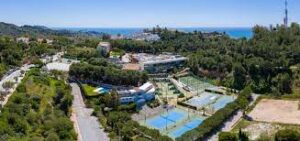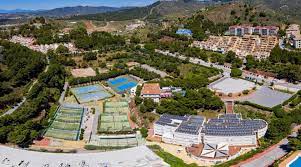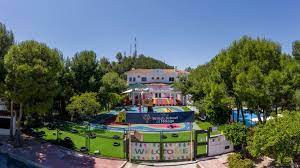
English Schools in Malaga
Looking for an English School in Malaga?
International schools are becoming increasingly popular for ex-pats living in Malaga, offering high-quality education and job opportunities for children new to Malaga offers students of all ages. Here are some of the international schools available in Malaga and the surrounding Costa del Sol region:

Swans International School: Swans International School is a private school located in Marbella, offering a British education and international environment for students aged 3-18. The school follows the National Curriculum of England and also offers the International Baccalaureate program for students aged 16-18.
Queens British Grammer School: The Queens British Grammer School in Estepona is a private school located in Estepona, offering a British education for students aged 3-18. The school follows the National Curriculum of England and also offers the International Baccalaureate program for students aged 16-18.
St. Anthony’s College: St. Anthony’s College is a private school located in Málaga, offering a British education for students aged 3-18. The school follows the National Curriculum of England and also offers the International Baccalaureate program for students aged 16-18.
Benalmádena International College: Benalmádena International College is a private school located in Benalmádena, offering a British education for students aged 3-18. The school curriculum follows the National Curriculum of England and also offers the International Baccalaureate program for students aged 16-18.
These schools offer a range of extracurricular activities and programs, as well as a high-quality education that prepares students for success in university and beyond. There are also a variety of other bilingual and English-language schools throughout the Malaga region. When choosing a school, consider your child’s educational needs and preferences and first language first, as well as your location and budget.
Estimates Fees For English Schools in Malaga
Here are the estimated fees for some of the private English schools in Malaga:
The British School of Malaga: The fees at The British School of Malaga can range from €4,675 to €9,910 per year, depending on the age of the student and the program they are enrolled in.

Aloha College: The fees at Aloha College can range from €7,580 to €11,650 per year, depending on the age of the student and the program they are enrolled in.
Swans International School: The fees at Swans International School can range from €7,480 to €13,490 per year, depending on the age of the student and the program they are enrolled in.
It’s important to note that these fees are just estimates and can vary depending on the specific program and age of the student. Additionally, there may be additional fees for things like textbooks, uniforms, and extracurricular activities.
Do English Schools in Malaga, Follow the UK curriculum?
Many English schools in Malaga do follow the UK curriculum, as they are designed to provide a British-style education to students. This typically includes subjects such as English, maths, science, and social studies, as well as additional subjects such as art, music, and physical education. Some international schools may also offer the International Baccalaureate program, a globally recognized curriculum focusing on critical thinking and problem-solving skills.
However, it’s important to note that not all English schools in Malaga follow the
Do English Schools in Malaga offer GCSEs?
Yes, many English schools in Malaga offer GCSEs (General Certificate of Secondary Education), which is a qualification typically taken by students in the UK at the end of their secondary education.
GCSEs are designed to assess students’ knowledge and skills in a range of subjects, including English, math, science, and social studies. They are typically taken by students aged 14-16 and are recognized as a qualification by universities and employers in the UK and around the world.
English schools in Malaga that follow the UK curriculum may offer GCSEs as part of their full secondary school further education program. However, it’s important to check with individual schools to confirm whether they offer GCSEs and the specific subjects that are available.
How Many Children Per Class In A English School In Spain?
The number of children per class in English schools in Spain can vary depending on the specific school and the age of the students. Generally, class sizes tend to be smaller in primary schools and larger in secondary schools.

It’s important to note that class sizes can also vary depending on the location of the school, with schools in larger cities often having larger class sizes compared to schools in more rural areas. Additionally, some schools may have different policies for class sizes depending on the program or curriculum they offer.
Spanish State Schools
Spanish state schools are funded by the government and provide education to students from the ages of 3 to 18. Here are some general characteristics of Spanish state schools:
Curriculum: Spanish state schools follow a national curriculum that is regulated by the Ministry of Education. The curriculum covers all lessons in a range of subjects, including language, math, science, social studies, and physical education.
Bilingual education: Many Spanish state schools offer bilingual education, which means that students learn both Spanish and English or another foreign language. This is an effort to prepare students for a more globalized world and to improve their employment prospects.
Classroom culture: Spanish state schools tend to be more structured and formal compared to schools in some other countries. Discipline is emphasized, and students are expected to show respect to their teachers and peers.
Extracurricular activities: Spanish state schools and universities, may offer a range
School hours: Spanish state schools typically have a longer school day compared to schools in some other countries. Students may attend classes from 9am to 2pm, and then return for afternoon classes from 4pm to 6pm.
Spanish state schools provide a structured and rigorous education that emphasizes discipline and academic achievement. While they may have some differences from schools in other countries, they can provide a high-quality education for students in Spain.
How To Apply For A Spanish State Schools
To apply for a Spanish state school, you will need to follow these general steps:
Determine your child’s eligibility: Spanish state schools are typically open to children who are residents of Spain or the children of Spanish citizens. If your child is not a resident or citizen, you may need to provide additional documentation to prove their eligibility.
Research schools: Research different Spanish state schools in your area to find the best fit for your child. Consider factors such as location, curriculum, extracurricular activities, and facilities.
Visit other schools: Visit the schools you are interested in to get a better sense of their culture, environment, and programs. This can help you make an informed decision about which school to apply to.

Submit application: Contact the school or school district to obtain an application and submit the required documents. Be sure to meet any application deadlines and follow any additional instructions provided by the school.
Wait for acceptance: After you submit your application, you will need to wait to hear back from the secondary school regarding your child’s acceptance. If your child is accepted, you may need to complete additional paperwork or attend an orientation session at secondary school before they can start attending classes.
Applying for a Spanish state school requires research, preparation, and attention to deadlines and requirements. By following these steps, you can help ensure a successful application process for your child.
When Are The Spanish School Holidays?
The Spanish primary school and holiday calendar can vary depending on the region and the various primary school there, but generally, the primary school whole year in Spain is divided into three terms, and there are several breaks throughout the year. Here is an overview of the typical Spanish primary school and holidays:
Christmas break: This break typically lasts for two weeks, from around December 23 to January 7.
Easter break: This break can vary, but typically lasts for around 10 days in March or April, depending on when Easter falls.
Summer break: The summer break is the longest holiday period, lasting from around mid-June to mid-September.
Other breaks: There may also be shorter breaks throughout the course material the year, such as a fall break in October and a spring break in February.
It’s important to note that the specific dates for school holidays can vary depending on the region and the school. It’s recommended to check with your child’s school to confirm the exact dates of the holiday calendar.
What Extra Activities Do Spanish Schools Normally Offer?
Spanish schools typically offer a range of extracurricular activities to help students develop new skills and interests outside of the classroom. Here are some common extracurricular activities offered by Spanish schools:
Sports: Many Spanish schools offer a variety of sports, such as soccer, basketball, volleyball, and swimming. These activities can help students stay active, develop teamwork skills, and build self-confidence.
Music: Spanish schools may offer music classes, such as choir or instrumental lessons. Some schools may also have music clubs or bands that students can participate in.
Art: Art classes and clubs are another common extracurricular activity in Spanish schools. Students may have the opportunity to learn different art techniques or create their own projects.
Drama: Drama classes and clubs can help students develop public speaking and acting skills. Some schools and arts and may also have theatre productions that students can participate in.
Language clubs: Spanish schools may offer language clubs, where students can practice their language skills in a more informal setting. This can help students improve their language proficiency and cultural understanding.
Outdoor learning community education: Some Spanish schools may offer outdoor education programs like camping trips or nature walks. These activities, lessons and other classroom lessons can help students learn about the environment and develop outdoor skills.
These extracurricular activities can help students broaden their horizons, develop new interests, and provide opportunities for socializing and making new friends.
Tips For Moving To Spain With Children
Moving to Spain with children can be an exciting and rewarding experience, but it also requires careful planning and preparation. Here are some tips for making the transition as smooth as possible:
Research schools: Research different schools in the area you will be moving to, and consider factors such as location, curriculum, extracurricular activities, and facilities. It’s important to choose a school that meets the needs and interests of your children.
Learn the language: If you and your children don’t already speak Spanish, it’s a good idea to start learning the language before you move. This can help you communicate more effectively with locals and make the transition easier.
Get your paperwork in order: Make sure you have all the necessary documents for your children, such as birth certificates, passports, and medical records. You may also need to provide proof of residency in order to enrol your children in school.
Consider a relocation service: If you are feeling overwhelmed by the logistics of moving with children, consider using a relocation service. They can help you find housing, schools, and other resources that can make the transition easier.
Connect with other ex-pats: Joining a local ex-pat group or online community can be a great way to connect with other families who have gone through the same experience. They can offer tips and advice, as well as provide social support during the transition.
Moving to Spain with children requires careful planning and preparation, but it can also be a rewarding experience for the whole family. With the right resources and support, you can make the transition as smooth as possible and enjoy all that Spain has to offer.
How English students rated their experience in English Schools in Malaga?
Malaga is a popular destination for young people studying English as a foreign language, and there are numerous language schools located in the city centre. Many of these schools offer a range of courses, including general English, business English, exam preparation courses (such as Cambridge or IELTS), and English for specific purposes.
The quality of English language schools in Malaga can vary, and it’s important to research and compare schools before choosing one. You can check online reviews and ratings, as well as accreditation and recognition from language education organizations, such as the British Council or International House.
Many students have reported positive experiences studying English in Malaga, highlighting the city’s welcoming atmosphere, rich cultural heritage, and diverse range of activities and events. However, as with any educational experience, individual experiences may vary depending on factors such as the student’s level of motivation, teacher quality, course content, and school facilities.
What English school directors said about Malaga
Malaga is a vibrant and diverse city with a rich cultural heritage and a thriving tourist industry, making it an ideal location for students looking to immerse themselves in the English language and culture. The city is also home to a university and numerous language schools that offer high-quality English courses taught by experienced teachers.
Moreover, Malaga’s location on the southern coast of Spain provides students with easy access to a variety of outdoor activities, including hiking, beach-going, and water sports. The city is also within easy reach of other popular destinations in Andalusia, such other cities as Granada, Seville, and Cordoba, which offer further opportunities for cultural and linguistic immersion.
English school directors in Malaga are likely to view the city as a welcoming and supportive environment for language learners, offering a range of cultural, educational environment social, and recreational opportunities that can enhance the language learning experience.
Key Facts about Schools in Malaga
Here are some key facts about schools in Malaga:
- Location: Malaga is a city located on the southern coast of Spain, in the region of Andalusia.
- Language schools: Malaga is home to a large number of language schools, offering courses in English and other languages.
- Accreditation: Many of the language schools in Malaga are accredited by language education organizations, such as the British Council or International House.
- Courses: Language schools in Malaga offer a range of courses, including general English, business English, exam preparation courses (such as Cambridge or IELTS), and English for specific purposes.
- Teachers: Language schools in Malaga employ experienced teachers who are native speakers of English or who have advanced proficiency in the language.
- Facilities: Many language schools in Malaga offer modern facilities, including classrooms equipped with audiovisual technology, computer labs, and study areas.
- Accommodation: Language schools in Malaga often offer accommodation options for students, including homestays with local families, student residences, and private apartments.
- Activities: Language schools in Malaga often organize cultural and social activities for students, such as city tours, tapas evenings, and outdoor excursions.
- Climate: Malaga has a Mediterranean climate, with mild winters and hot summers, making it an ideal destination for year-round language learning.
- Transportation: Malaga has an efficient public transportation system, including buses and a metro system, making it easy to get around the city and explore the surrounding area.
FAQ about schools in Malaga
What types of English courses are available in Malaga?
English language schools in Malaga offer a range of courses, including general English, business English, exam preparation courses (such as Cambridge or IELTS), and English for specific purposes.
How can I choose the right English school in Malaga?
To choose the right British school in Malaga, it’s important to research and compare schools before making a decision. You can check online reviews and ratings, as well as accreditation and recognition from language education organizations, such as the British Council or International House.
What is the cost of studying English in Malaga?
The cost of studying English in Malaga can vary depending on factors such as the type of intensive language course being used, the length of the intensive course used, and the language school’s location and facilities. However, many language schools offer competitive prices and special discounts for longer courses or early bookings.
What is the level of English proficiency required to enrol in an English course in Malaga?
The level of English proficiency required to enrol in an English language course here in Malaga can vary depending on the school and the course. Some schools offer courses for all levels, from beginner to advanced, while others may require a certain level of proficiency to enrol in specific courses.
What is the best time to study English in Malaga?
The best time to study English in Malaga can vary depending on personal preferences and factors such as weather, cost, and school availability. Summer is a popular time for language courses in Malaga, but other seasons can offer lower prices and fewer crowds.
Are you looking for the best British school Malaga has to offer?
It’s important to research and compares different language schools in Malaga before deciding. You can check online reviews and ratings, as well as accreditation and recognition from language education organizations, such as the British Council or International House. You may also want to consider the language school’s location, the quality of the accommodation options, and the availability of cultural and social activities for students.
Ultimately, the best English language school here in Malaga for you will depend on your individual needs and preferences, such as your level of proficiency, your goals for learning British schools Malaga, and your budget.
How do I find the Best British School in Malaga?
To find the best British school in Malaga, you can follow these steps:
- Research different language schools in Malaga: Use search engines to find a list of language schools in Malaga, and visit their websites to learn more about the courses they offer, their facilities, and their accreditation status.
- Check online reviews: Check online reviews and ratings of the schools you are interested in on platforms such as Google Reviews, TripAdvisor.
- Look for accreditation and recognition: Check if the schools are accredited by reputable language education organizations, such as the British Council or International House. Accreditation is a mark of quality and ensures that the school meets certain standards.
- Consider the range of courses: Look for a school that offers a range of courses that meet your needs and goals, such as general English, business English, exam preparation courses, or English for specific purposes.
- Evaluate the quality of the teachers: Look for information about the qualifications and experience of the school’s teachers. A school with experienced and qualified teachers can help ensure that you receive high-quality language instruction.
- Check the facilities and location: Look for a school with modern facilities, including classrooms equipped with audiovisual technology, computer labs, and study areas. Also, consider the school’s location and its proximity to public transportation, accommodation, and cultural attractions.
- Consider the price: Look for a school that offers competitive prices and special discounts for longer courses or early bookings. However, be wary of schools that offer prices that are significantly lower than other schools, as this may indicate lower quality.
By considering these factors, you can find the best English school in Malaga that meets your needs and preferences.
Spanish State School vs A Private English School in Malaga
There are several differences between attending a Spanish state school and a private English school in Malaga.
Spanish state schools are funded by the government and follow the Spanish curriculum. The language of instruction is Spanish, and students will have the opportunity to learn English as a second language. State schools in Spain are free for all students, including international students, and may offer a wider range of extracurricular activities and opportunities to integrate with local students.
On the other hand, private British schools in Malaga are privately owned and may follow a curriculum that is different from the Spanish curriculum. The language of instruction is English, and students may have the opportunity to learn other languages as well. Private British schools often have smaller class sizes, which can lead to more individualized and personalized attention, and support for students. Private schools also typically have higher tuition fees than state schools, and may not offer as many extracurricular activities or opportunities to integrate with local students.
The choice between a Spanish state language school and a private British school in Malaga depends on the individual needs and preferences of the student and their family. If the student wants to improve their English language skills and receive instruction in English, then a private British school may be the better choice. However, if the student wants to learn Spanish and experience the local culture and way of life, then attending a Spanish state language school, maybe a better option. It is important to carefully consider the pros and cons of each option before making a decision.
Spanish Language Schools in Malaga
Malaga is a popular destination for learning Spanish as a foreign language, and there are numerous Spanish language schools located in the city. Here are some examples:
- Instituto Picasso Malaga: This language school offers Spanish language courses for all levels, from beginner to advanced, as well as a range of specialized courses, such as business Spanish, medical Spanish, and Spanish for teachers.
- Malaga Spanish School: This language school offers a range of Spanish courses, including group courses, private courses, and intensive courses. The school also offers accommodation options for students, including homestays with local families and student apartments.
- Academia CILE: This language school offers Spanish courses for all levels, from beginner to advanced, as well as exam preparation courses for the DELE and SIELE exams. The school also offers cultural and social activities for students, such as city tours and flamenco shows.
- La Playa Escuela de Español: This language school is located near the beach and offers Spanish courses for all levels, as well as specialized courses such as Spanish for seniors, Spanish for families, and Spanish for professionals.
- Malaca Instituto: This language school has been providing Spanish courses for over 50 years and offers courses for all levels, from beginner to advanced, as well as exam preparation courses for the DELE and SIELE exams. The school also offers a range of accommodation options, including homestays, student residences, and private apartments.
These are just a few examples of the many Spanish language schools in Malaga. When choosing a language school, it’s important to consider factors such as the quality of the teachers, the range of courses offered, the facilities available, and the location of the school.
If you’re looking for a property in Malaga, please contact the team today and we can help you, find your dream property. Start living the dream in Malaga!
